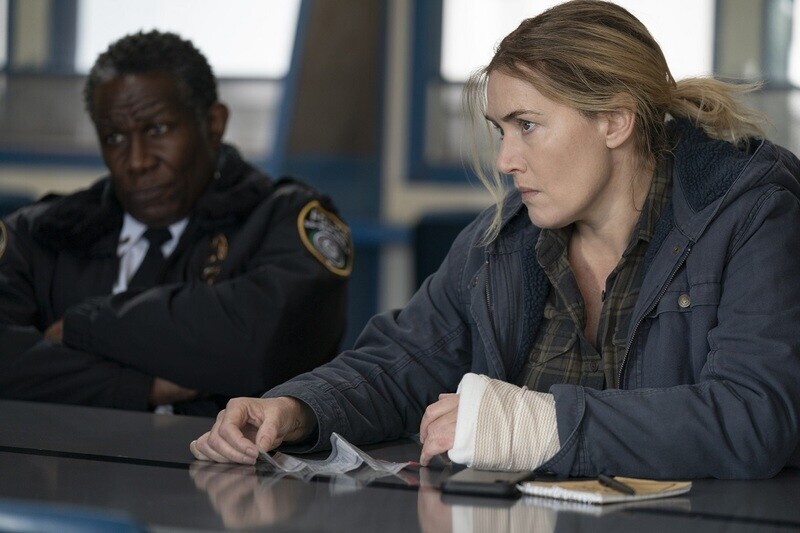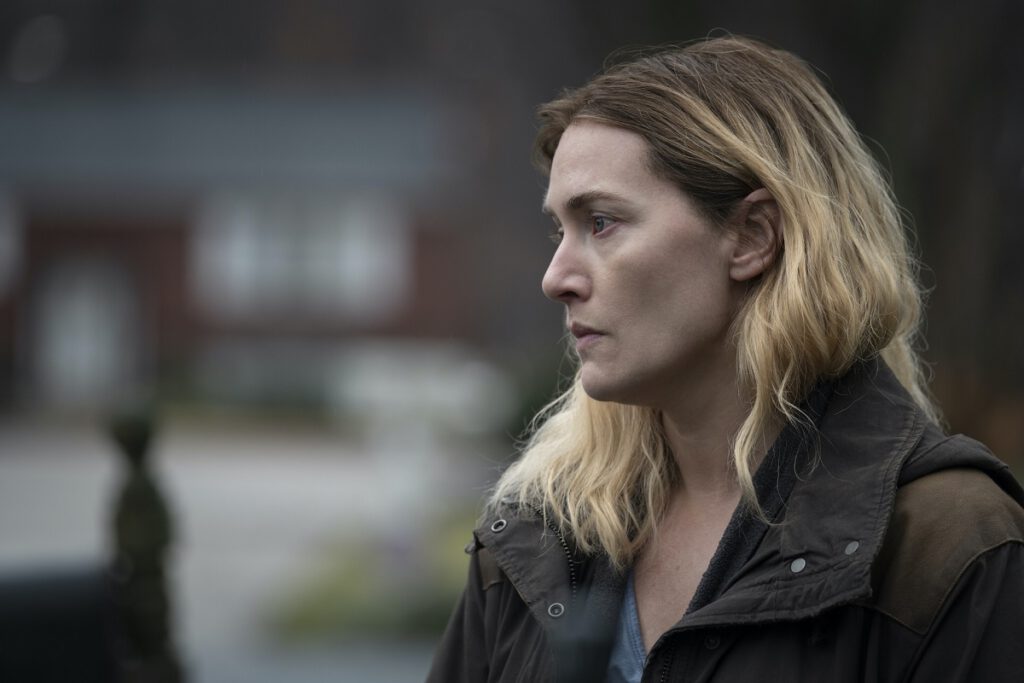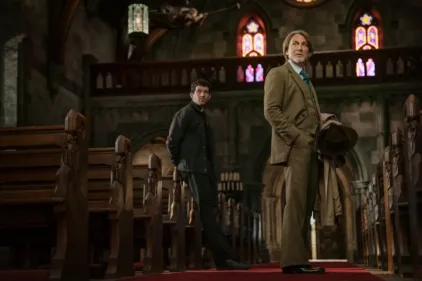Screenwriter, producer, and “Mare of Eastown” creator, writer, exec producer Brad Ingelsby knows a little something about being trapped in the world of small-towns and their insular, sometimes suffocating dynamics. “Listen,” if I didn’t sell my first script, I’d still be where I grew up,” he insists. Where the writer grew up is Berwyn, Pennsylvania, and his latest effort, the already acclaimed HBO mini-series “Mare Of Easttown,” is arguably a greatest hits compendium that pulls from the milieu around his life in small-town P.A.
In the series, Kate Winslet is the eponymous heroine, a lead detective in a missing girl and murder investigation. But much of the layered world that envelopes her—sports, athletes, the Catholic Church, suburbs of Philadelphia—are drawn from Ingelsby’s experiences. 2013’s “Out of the Furnace,” which he wrote, directed by Scott Cooper, pulled from some of these hard-luck environments, as did last year’s “The Way Back,” a basketball drama starring Ben Affleck about a recovering alcoholic and former would-be basketball sensation.
“Mare of Easttown” is different but springs from similar blue-collar notions of struggle and being stuck. Kate Winslet, Mare, is a former athlete whose winning shot in a basketball game 25 years ago still haunts her today. In some ways, it’s her greatest achievement, one she’ll never top. In another regard, it’s created an illusion of excellence around her that she has been preserving for half her life. But as her world begins to crumble—the product of tremendous trauma and subsequent emotional band-aids that never worked—the façade of the great Mare of Easttown is falling apart.
“Mare of Easttown” is a crime procedural, but it’s also a story about family, the gift and curse of expectations, faded glory, and the idea of finally confronting the pains that have hardened your heart.
The mini-series is really having its moment. I know some people dislike the “it’s a long-form movie in television” idea, but the mini-series does feel like the best of both worlds: a genre element from a movie, but the character and the depth of television storytelling and then allowing room for both of these elements to breathe and get their due. How did this one originate?
Honestly, it started with a character. I just loved this idea of Mare as a character. I had a buddy on the East coast who was a cop, and he told me about working at his little police station in this little community—him, 11 officers, one detective, and they work in a train station that they’ve converted into a police station. I was like, “Wow, this is interesting texture.” And that got the wheels of the world turning. “What would this lady look like? What does her personal life look like?” So, it always starts with a character that I was already building.
Then I started constructing the connective tissue with all the other community characters and building from there. The priest, the Catholic church—I did grow up with a lot of these elements in the show, and I think that was all born from the desire to talk about how and where I grew up.
That’s interesting because one element that spoke to me—especially in the early episodes—was the melancholy of being trapped in a small town, not escaping it, and the inability ever to reinvent yourself because everyone knows your business and your baggage. That’s suffocating.
Exactly. At the same time, there’s comfort in the known. A comfort in, “if I never leave, then I never have to face the fear of failure or leaving.” There’s a comfort in staying home, but there’s also an opportunity cost. There’s a lot of the “what if” of life. The story begins in a moment in time when Mare is stuck in life. That’s really what the opening episode is about. We bookend that episode with two phone calls—it’s her waking up to life in a way because she’s gotten into this rut. And a lot of painful things have happened to her, but she’s stuck. What we tried to do, especially at the end, it’s this phone call that’s a trigger: she has to wake up, and she has to get on with her life or at least begin that journey. And listen, if I didn’t sell my first script, I’d still be where I grew up. So, I’m one of those people too.

I also love how the show talks about success and failures, those psychological impacts on people, and how it builds on cultural phenomena we’ve seen in small towns. Like the idea of “peaking too early,” which is something that threatens to smother Mare. That high school mountaintop that everyone talks about with her basketball victory. That’s not a triumph for her; it’s an irritation and hindrance, a reminder of faded glory that seems to be in the rearview mirror.
Yes. I grew up with a sports background. My dad was a basketball player; my brother was a basketball player at Notre Dame. So, I grew up with that, and that’s always fascinated me—people who have dedicated their lives to a single pursuit. Now Mare was never going to be in the NBA, but I’m always interested in athletes who’ve given their life up for this one thing. I’m going to be this thing. It’s identity.
But I’ve always been interested in the second life of athletes, what comes after and what it means for them. Mare is one of these people. She had this glory, but what’s her life look after? And like you’re suggesting, it’s kind of been all downhill for her. She peaked early, and now everyone that held her up to this standard of greatness is like, “you’re not solving the cases and, your life’s a wreck.” But there’s a resiliency in her that I really admire; she keeps getting up again and again.
That faded glory is also an albatross that she resents. There’s that line in episode five that feels like the series’ entire thesis statement: “doing something great is overrated,” and the wonderful subtext of that is, “expectations are a bitch.”
Totally. In Mare’s case, expectations are rough. But she’s also someone who liked the façade when it worked. She’s liked this idea that people look up to her, but now it’s cracking, and she can’t hold it together anymore. For years she was able to preserve that façade with scotch tape and glue. But now everything’s exploded in a way she can’t keep together. We’re meeting her at a point in her life where she’s just incapable of holding it together, which is a good starting place dramatically.
It’s terrifically written, but you’ve also got Kate Winslet, who is knocking out it of the park in every scene. Craig Zobel, I’d argue this is his best directorial work. Tell me what they brought to it and how it evolved. Presumably, as writer, showrunner, exec-producer, you’re involved in all those creative decisions.
Well, Craig came later. We had Gavin O'Connor [as director at first], and then our schedule got bumped, and it became clear it just wasn’t going to work. We got delayed, and it was a little crazy.
But with Kate, I just sent her the first two scripts through her agent. I never expected she would respond, my God, she’s iconic, but I think we just got to her at the right time. She was interested in doing something new; she wanted to take on a role that she hadn’t ever played before. She told me she’d never held a gun in any role she’d ever had, which shocked me given how many roles she’s played over the years. I think the appeal was, “this character is not like me at all. And that’s appealing to me.” She’s so great. I think about all the therapy scenes and what she’s able to do emotionally in the context of one scene is pretty incredible.
And it’s Kate Winslet, and she’s a small-town cop, and you completely buy her as this person, which is a disappearing act as far as I’m concerned. That’s not easy to pull off, and she does it effortlessly.
Craig gets all the genre elements, but he also knew that this was a show that had to appeal emotionally and had to be about these relationships. He just understood that inherently and we had such a great cast. I can’t speak enough of Julianne Nicholson, Jean Smart, Evan Peters, the entire gallery. We just got fortunate. I can write all the crappy dialogue in the world, but when they say it, it makes sense, you know?

Did you guys talk sympathetic characters at all? Because what I love about Kate and her performance is, it’s grumpy, it’s dowdy, she’s highly unvarnished, she’s incredibly cynical and bitter, and the show and the performance are very unapologetic about that. However, even though you don’t seem to make any concessions about making her “more likable,” we still totally empathize with her. That’s one of the unique magic tricks of the show in my mind because most shows would make that concession.
Well, I’m happy to hear you say that because Kate really embraced all that too. Mare is someone that is at her worst with the people that are closest to her. She doesn’t know how to be nice to her family members. But yet with Beth in the opening episode, a woman who’s going through this thing where her brother’s a chronic drug addict, she’s incredibly empathetic. And that’s something we played with: Mare can be empathetic to people who aren’t close to her, and that’s a really interesting thing, right?
When it comes to her own clan, she’s incredibly harsh. And it’s because all these things are simmering there—all these old hurts, resentments, wounds, and some things that just haven’t been resolved. And you’re right; she does some awful things, and yet you’re always on her side, which I think is a testament to Kate’s ability that you can still root for her, and you want to see her get up all the time. That’s just a great actress doing great work.
Another refreshing element of the show is the humor. A prestige show like this—look, we’ve seen versions of this that are just too damn dour and oppressive. The humor here feels like ballast to the dark stuff and really human because many people often use humor to cope.
The character evolved as Kate took ownership of it. It’s one thing when it’s on the page, but it started to shift once we gave it to Kate. She would be like, “I have this backstory I’ve created about what Mare was like as a kid and how she would stand up to bullies, and she would protect her friends.” And one of the things she leaned into was constantly pushing me to do more—it improved the humor in the show. Because it was there, but not like it is in the final product.
And it helped because it gets heavy at times, goes to dark places, and talks about some heavy things, but it never feels too heavy. There’s a balancing act. Part of that is Kate’s interactions with Jean Smart; there’s a lot of inherent humor there. There’s always a bit of lightness, and obviously, Evan Peters is really good at this too, because he has excellent experience with comedy.

Tell me about the mix of plot and genre, balanced with character and character story. Because it almost veers back and forth in a way that almost makes you think one will fade to the background, but they’re both wonderfully weaved together. I imagine this is the luxury of a movie-like genre story that still has the time to breathe in television.
That was the tight rope walk of the show. I wrote it as a drama that had a procedural element. So, I never wanted the procedural to swallow the show. And there are times in the last two episodes where we have to ramp up the tension as the clues start to come in, and it becomes more of a beast to deal with, but I don’t think we ever lose the drama.
Because it always started with the idea of a woman who has to confront grief. That’s what the show is about. This is a woman who’s deferred grief. She won’t confront the thing that’s haunted her. And the way she’s postponed that confrontation is by throwing herself into these cases. So, you can’t lose sight of that. In the midst of that, she has to deal with her mother. She has to deal with her daughter, who has terrible resentments. It’s not just about solving the case. It’s like, “I have to deal with all these people in my life that I’ve been able to hold at arm’s length, but now, I have to face them.”
I’m glad that it never feels like a total procedure or a total drama because I think it should be both. When you get to the end, it’s still about a broken family that has to come together in their own way. Is it going to be perfect? Hell no, but maybe they’ll be okay. What I want the audience to leave with is that there is light at the end of the tunnel.











